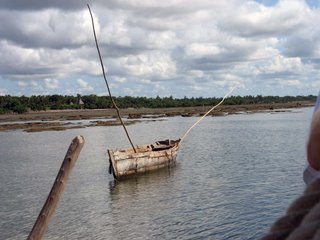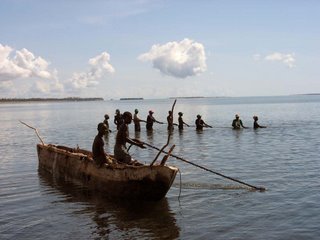And then we went to Pangani...
On our 5 hour drive (in our NEW car--at last--hooray!) we passed many small villages that really opened our eyes to what life is like throughout the country. Small houses made of mud bricks and sticks--no doors or windows, no electricity or water. One small groups of homes was near a sign that proclaimed the primary school was 8 kilometers away--that's about 5 miles one way for a child to walk. There was just nothing around these communities that spoke to anything other than subsistence living. As we approached the "resort" (that seems a fancy word for a very low-key family friendly pretty inexpensive place) the landscape changed dramatically. Giant palm trees were mixed with sisal farms. The humidity was up and the heat was on!

This is a dhow, a traditional wooden sailing boat found up and down the coast of Tanzania. They have one sail and a rudder and usually several poles for maneuvering in shallow water. This is a relatively small one, but the larger ones seem to carry 6-10 people plus the catch. Every morning we would see the dhows and outriggers begin to head out before the tide went out. The weather was very hot and humid and the sun was intense. I can't imagine what it must be like to spend 6 or 7 days a week out on the water like that. Remember Hemingway's "Old Man and the Sea"? I thought about old Santiago as I saw these ancient wooden boats heading out to sea and the uncertainty they face every day. I have such a strong sense of being out of place whenI'm are out on the water, so far removed from familiar land.
 This is crew pulling in their nets. There's another group of 6-7 guys behind me as I'm taking the picture also pulling. They'll pull for probably 20 minutes, while a couple guys are swimming at the far edge of the nets guiding them in. As the nets get closer, there's a large bag at the end and the swimmers will get inside the nets and begin slapping the water to move the fish down into the bag. When it's all said and done, there doesn't seem to be a lot of fish for the effort! Then, they head out and cast out the nets again and repeat the process. It's brutal work, spending your life standing in water under broiling sun and pulling those nets. But that's the picture of Tanzania. Those who are working are working impossibly hard for so very little.
This is crew pulling in their nets. There's another group of 6-7 guys behind me as I'm taking the picture also pulling. They'll pull for probably 20 minutes, while a couple guys are swimming at the far edge of the nets guiding them in. As the nets get closer, there's a large bag at the end and the swimmers will get inside the nets and begin slapping the water to move the fish down into the bag. When it's all said and done, there doesn't seem to be a lot of fish for the effort! Then, they head out and cast out the nets again and repeat the process. It's brutal work, spending your life standing in water under broiling sun and pulling those nets. But that's the picture of Tanzania. Those who are working are working impossibly hard for so very little.


1 comment:
I love these pictures.
Post a Comment